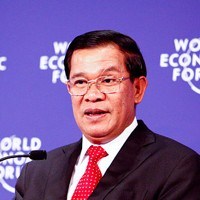An accord on electoral reform reached this week between Cambodia’s long-ruling Cambodian People’s Party (CPP) and the opposition Cambodian National Rescue Party (CNRP) ended three days of protests in the capital but did not convince the CNRP to drop its threat to boycott the opening session of parliament next week.
According to the current vote tally from Cambodia’s July elections, which were widely considered flawed, the CNRP won 55 seats in Cambodia’s 123-seat legislature, the bulk of them from Phnom Penh and its nearby provinces. While falling short of a majority, the number represents an unprecedented gain of 22 seats for the opposition and denies the CPP the two-thirds majority it previously enjoyed, which is also the threshold required for amending Cambodia’s constitution.
But the CPP under Prime Minister Hun Sen, who has held the office for nearly three decades, maintains that it can legally take all of parliament’s seats if the CNRP carries through on its threat. The move would disenfranchise the broad swath of Cambodian society—particularly young and urban voters but also farmers and people of all income ranges—that hoped to dislodge the CPP from power, thousands of whom turned out in demonstrations this week to demand an independent investigation into the vote count.

